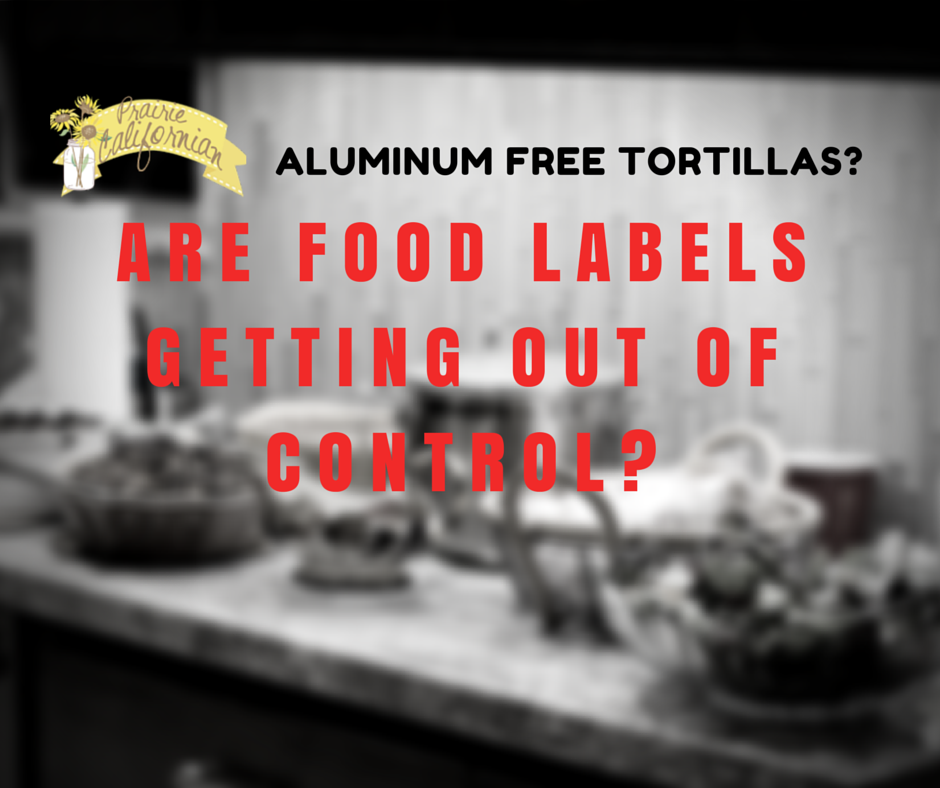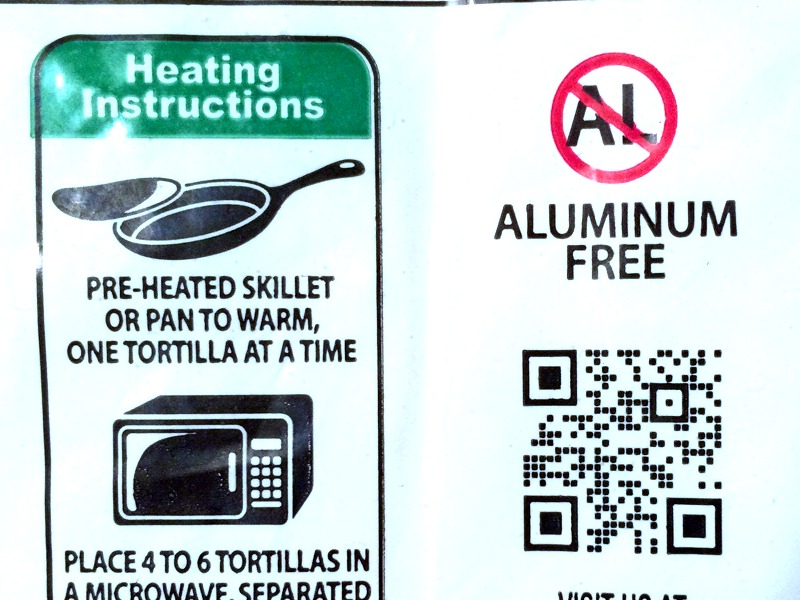
The other night the hubby and I were in the kitchen. I was stirring some taco meat on the stove while the hubby was setting the table. He reached in the fridge and got out our usual staples for taco night: sour cream, cheese, lettuce, tomatoes, and flour tortillas.
He set the tortillas on the table and laughed. I turned around and asked “what’s up?” He proceeds to tell me, in case I was wondering, our tortillas were aluminum free. Cue a very funny look on my face trying to make sense of what he just said to me. Why in the world would our tortillas have aluminum in them in the first place?
I dug in the fridge and pulled out another package. No aluminum free sticker on that one. I flipped the package over and found my answer. There in the ingredients was Sodium aluminum phosphate. Huh. Sounds scary doesn’t it? What the heck is sodium aluminum phosphate and why in the world is it in my tortillas?
I went to Google. Come to find out, sodium aluminum phosphate is likely in many of the things I eat. Sodium aluminum phosphate is an active ingredient in baking powder. I use baking powder all the time. Most commercially available baking powders are made up of sodium bicarbonate (baking soda) and one or more acid salts. What is that acid salt? You got it. Sodium aluminum phosphate or some other acid salt depending on which baking powder you purchase. These acid salts combine wit the sodium bicarbonate and water to produce carbon dioxide and leaven the bread much like yeast, but without a fermented taste.
I think most of us can agree, we don’t have a problem with baking soda or baking powder being in our tortillas. I mean, we all grew up eating grandma’s cookies, which contain the same exact ingredient. So why in the world is this tortilla company labeling their tortillas aluminum free? Why do they feel it is necessary?
Is it possible they put the aluminum-free label on their tortillas just so that I purchase their brand of tortillas versus the many others on the shelf?
With the many different lifestyles, fad diets, and variety of ways to eat, is it any surprise that navigating our food system is tough? Then throw in the fact that companies are now using labels as a means to sell their product. We’ve got gluten free labels on things that don’t even contain gluten in them in the first place. Why? Because people trying to avoid gluten in their diet see that label and buy it.
So What IS Required On Our Food Labels?
Allergens
I fully embrace the struggles of navigating our food system when you suffer an allergy or an autoimmune disease. And I embrace labeling our food that causes potential allergens for those who do. As those of us producing food and distributing food, we take these concerns seriously and we do our best to label foods accordingly. Even the government is on board with this notion. The Federal Food, Drug, and Cosmetic Act requires all foods containing a major food allergen to be labeled as such. Major food allergens consist of things like: milk, eggs, fish, shellfish, tree nuts, wheat, peanuts, and soybeans.
Nutrition & Ingredients
We also take listing ingredients seriously and it is also something that is regulated. Ingredients lists by law are to disclose things like nutrition facts, food additives, and of course ingredients. Food additives are anything that preserves flavor or enhances taste and appearance. Simple things like vinegar are a food additive that has been used for centuries. You can look up a full list of what is considered a food additive. Things like anticaking agents, food coloring, emulsifiers, preservatives, and sweeteners are all required to be disclosed on a label.
Other Information
Of course, it is necessary that food manufacturers include safety information on the food we eat. This includes things like shelf life dates, refrigerate after opening, and also the allergens and intolerances we talked about above. Other information we find on labels includes preparation instructions as well as geographical indication, which contains the country of origin to be disclosed.
What About Pure Marketing?
So we’ve got labels for health concerns, nutrient content, safety, preparation instructions, geographical indication. My concern is what about all these labels that have nothing to do with all of the above, but are all about marketing?
The FDA regulates several terms outside of the health and nutrient concerns, those terms are “gluten-free”, terms used on dietary supplements, and the terms “fresh, freshly frozen, and frozen fresh”. That’s it. Essentially, as long as companies are not making false claims, any other terms on the label are allowed.
This means labels like hormone free on pork chops when pork is never given hormones in the first place is misleading to consumers, but legal because it isn’t making a false claim. The pork indeed doesn’t contain hormones and never did.
Where do we draw the line? How far is too far? And at what point do our food labels become misleading? And where does personal responsibility come into play?
Much like you, I want transparency in our food. I want to know what is in my food. And I, too, am calling for accountability from companies who produce our food.
But at some point, we’ve reached a point where it has gone too far. And in order to get back to where we once were, we are going to have to take some responsiblility for the food that goes into our mouths. Regardless of what a company puts on a label, you have two eyes and access to things like Google.
We can’t expect food companies to label every single allergen out there, otherwise our food labels would cover the entire package. We can, however, expect food companies to label whatever is the latest “buzzword” or craze. Because, the truth is, it lures you in to buy it.
Is it possible that the very thing we are calling for, more labels on our food, is the exact same thing that is giving us the wrong impressions about what is in our food? Have our food labels gotten out of control? Or do we really need more on them?
Just take my tortillas for example.
Resources on Food Labeling & Regulation:


Great post Jenny. I understand why food companies are including different “buzz words” on their packaging, even though they may have always been gluten free or even aluminum free… But I agree things have gone too far!
Just this morning, I opened the fridge and looked at a pack of tortillas and saw the exact same no aluminum morning, got curious and googled it. Your blog was the first that showed up. Thanks for the answer.